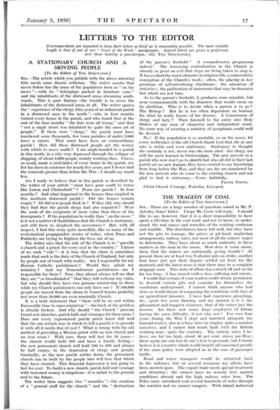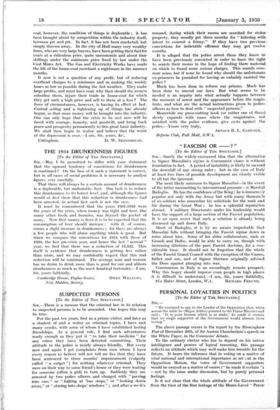THE TRAGEDY OF COAL
[To the Editor of THE SPECTATOR.] SIR,—There are a large number of questions raised in Mr. P. Asterley Jones' letter. I hope Mr. Coote will reply. I should like to say, however, that it is a sheer impossibility to have spent a life-time in the coal trade and not to know, or under- stand, the real causes and remedies of the existing confusion and muddle. The distributors know full well, but they have not the pits to manage, the prices at pit-head, marketing arrangements, railway rates, nor most of all the miners' wages to determine. They have about as much authority in these matters as the man in the moon. How does it come about, then, that the miners are continually giving trouble ? At present there are at least two Yorkshire pits on strike, another four have just got their dispute settled (at least for the moment) and the latest news is that there may be a complete stoppage soon. This state of affairs has existed off and on for far too long ; it has caused endless loss, suffering and misery.
I would that certain of your readers could obtain permission to descend certain pits and examine for themselves the conditions underground. I cannot think anyone who had done so would dream of comparing the conditions with that of an agricultural labourer. I have had experience ploughing, &e., spent five years farming, and my opinion is it is the pleasantest and happiest existence, that of the miner just the reverse. Are there now many large employers of labour having the same difficulty, if not why not ? For over four years during the War I slept and marched alongside the manual worker, also in a busy time we employ quite a number ourselves, and I cannot find much fault with the British working man—quite the contrary. The railway rates, I be- lieve, are far too high, about 40 per cent. above pre-War ; there again one can but do one's best to persuade, but I firmly believe it is a matter which would benefit all concerned greatly if the same policy were adopted as in the case of passenger traffic.
Road and water transport would be attracted back to the railways, but on several occasions my efforts have been snowed upon. The export trade needs special treatment and attention ; the owners have no remedy here against conditions abroad and the high railway rates here. The Poles carry subsidised coal several hundreds of miles through the corridor and we cannot compete. With inland industrial
coal, however, the condition of things is deplorable ; it has been brought about by competition within the industry, itself, between pit and pit. In fact, it has not been marketed, but simply thrown away. In the city of Hull many very wealthy firms, who are very large buyers, have been getting their fuel for years at a ridiculous price, quite uneconomic and about four shillings under the minimum price fixed by law under the Coal Mines Act. The Gas and Electricity Works have made the life of the house-coal merchant a nightmare in the summer months.
It now is not a question of any profit, but of reducing overhead charges to a minimum and so making the weekly losses as low as possible during the hot weather. They make large profits, and must have coal, why then should the owners subsidise them, injure their trade in house-coal for which they get such a high price and sell to them at a loss ? The force of circumstances, however, is having its effect at last. Central selling and a tightening up of things has already begun, so that more money will be brought into the industry. One can only hope that the crisis to be met now will be faced with courage, honesty, and goodwill, and bring back peace and prosperity permanently to this great basic industry. We shall then begin to realise and believe that the worst of the depression is over.—I am, Sir, yours, &c.,











































 Previous page
Previous page